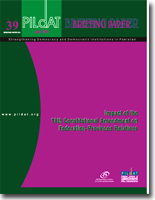The 18th Constitutional Amendment has omitted the Concurrent List from the 1973 Constitution there by adding to the legislative and administrative responsibilities of the provinces in Pakistan. This has been done, among other things, in line with the long-standing demands of the provinces for greater provincial autonomy in Pakistan. Earlier, the 7th National Finance Commission Award (NFC) also significantly altered the resources-distribution formula in favour of the provinces. How do these changes affect the Centre-Provinces relationship, especially the provincial responsibilities and rights? The 18th amendment represents a historical consensus with far-reaching impact on the way relations between the Federation and the provinces are conducted. A greater awareness of this change and the resulting requirements of capacity enhancement and better governance need to be created at all levels of the society but especially among the Provincial legislators, Provincial government officials and the Provincial Assembly staff. It is with this background that PILDAT has commissioned this Briefing Paper on the topic of Impact of the 18th Constitutional Amendment on Federation-Provinces Relations. Authored by Mr. Shahid Hamid, Senior Advocate Supreme Court of Pakistan and former Governor Punjab and former Federal Minister, the paper presents a concise overview of the 18th Constitutional Amendment and how, together with the 7th NFC Award, the relationships and responsibilities between the federation and the provinces and the quantum of provincial autonomy are affected. This paper is published by PILDAT under the Parliamentary and Political Party Strengthening Project which is funded by Canada’s Department of Foreign Affairs and International Trade (DFAIT) and is implemented jointly by the Parliamentary Centre, Canada and PILDAT.







